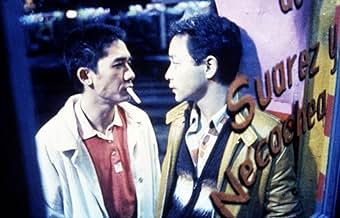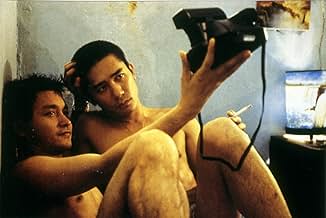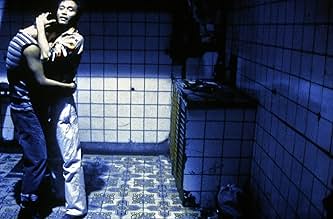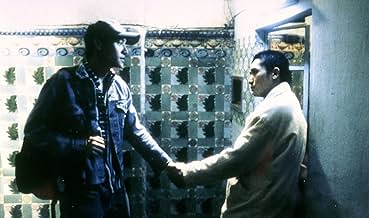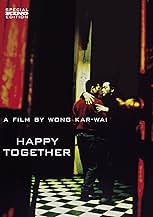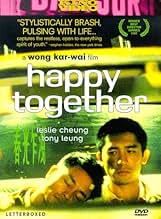NOTE IMDb
7,7/10
37 k
MA NOTE
Un couple fait un voyage en Argentine, mais les deux hommes se rendent compte que leurs vies prennent des directions opposées.Un couple fait un voyage en Argentine, mais les deux hommes se rendent compte que leurs vies prennent des directions opposées.Un couple fait un voyage en Argentine, mais les deux hommes se rendent compte que leurs vies prennent des directions opposées.
- Réalisation
- Scénario
- Casting principal
- Récompenses
- 7 victoires et 20 nominations au total
Tony Leung Chiu-wai
- Lai Yiu-fai
- (as Tony Chiu Wai Leung)
Shirley Kwan
- Fai's Girlfriend
- (scènes coupées)
Avis à la une
Happy Together is a throbbing, raw, and profoundly nostalgic lament from two displaced traveling Chinamen yearning for emotional soundness, for their homeland, and for each other. Wong doesn't front us any of the flickering that can still be struck between lovers who fight all the time. There is no deep poetic interpretation of the story itself, but by leaving so much unsaid, writer-director Wong Kar-Wai doesn't make the misstep of suffocating his characters' relationship with trite soap dialogue. That is not to say, however, that the film even remotely knows the meaning of the phrase "less is more."
You don't watch this film as much as seize on to it. Letting it yank you every which way is a raucous yet intriguing excursion, with fertile visual stylizations that trail you long after seeing the film, all with the impact to communicate directly with the heart. The visuals make the film come alive, and make material the displacement, and thus the unhinging, that the main characters feel from their surroundings and each other. Rather than using dialogue, this highly stylized romance chiefly imparts its themes and moods through its images, and Wong fashions an interior audiovisual composition about the mood swings of a love affair. Wong's use of images for purely emotional photogenic value, feverish camera movements, jukebox soundtrack and his improvisation and experimentation with the actors have an effect reminiscent of Scorsese's Mean Streets. In Wong's emotional roller coaster of a film, the characters seem to have a formidable intuitive certainty that their relationship is star- crossed sooner or later, but they follow passionate impulses regardless, giving the film a dreamy texture that it can't shake as its lovers turn-step to and fro during their free-form Argentine spree.
Wong gradually layers the relationship, just like it would happen in real life, and the doubts and obscurities are constant. He extracts powerful performances from his lead actors. While Leslie Cheung gracefully fluctuates his moments between yearning, resentment, and anger, Tony Leung Chiu-Wai is the calm eye of the storm.
Leung acts from the inside. We intuit his feelings through his natural physical subtleties, chiefly through the sensitive eyes. Even purely physical scenes, like the fights he has with Leslie Cheung's character, don't happen suddenly. Leung winds up for these moments instinctively and then defensively underplays them. And when the tears come, they pour without affectation, making me wonder from what part of Leung's soul he quietly unearths these moments from as Wong rolls the camera.
You don't watch this film as much as seize on to it. Letting it yank you every which way is a raucous yet intriguing excursion, with fertile visual stylizations that trail you long after seeing the film, all with the impact to communicate directly with the heart. The visuals make the film come alive, and make material the displacement, and thus the unhinging, that the main characters feel from their surroundings and each other. Rather than using dialogue, this highly stylized romance chiefly imparts its themes and moods through its images, and Wong fashions an interior audiovisual composition about the mood swings of a love affair. Wong's use of images for purely emotional photogenic value, feverish camera movements, jukebox soundtrack and his improvisation and experimentation with the actors have an effect reminiscent of Scorsese's Mean Streets. In Wong's emotional roller coaster of a film, the characters seem to have a formidable intuitive certainty that their relationship is star- crossed sooner or later, but they follow passionate impulses regardless, giving the film a dreamy texture that it can't shake as its lovers turn-step to and fro during their free-form Argentine spree.
Wong gradually layers the relationship, just like it would happen in real life, and the doubts and obscurities are constant. He extracts powerful performances from his lead actors. While Leslie Cheung gracefully fluctuates his moments between yearning, resentment, and anger, Tony Leung Chiu-Wai is the calm eye of the storm.
Leung acts from the inside. We intuit his feelings through his natural physical subtleties, chiefly through the sensitive eyes. Even purely physical scenes, like the fights he has with Leslie Cheung's character, don't happen suddenly. Leung winds up for these moments instinctively and then defensively underplays them. And when the tears come, they pour without affectation, making me wonder from what part of Leung's soul he quietly unearths these moments from as Wong rolls the camera.
In "Happy Together" Director Wong Kar Wai tells us the story of a relationship that does not survive the alienation inside and outside.
The film is set in Argentina where two lovers are stranded because they don't have enough money to return to their native Hong Kong.
The film shows us that Fai and Po-wing are unable to find equality or balance in their relationship. It is a story about the way most relationships are defined by the balance of power.. and how this leads to despair. Fai reflects that their relationship was the happiest when Po-wing was ill and had to be cared for like a child. As Po Wing's health improves Fai draws away from him and refuses his attempts of closeness, illustrated by the constant battles over couch and bed. When Po-Wing is well enough to go out again by himself the balance of the power in relationship shifts. Po-wing slowly but surely slips away into the world of hustling. He never finds his way back to Fai who eventually saves enough money to go home.
Both are emotionally devastated by the loss of their lover. We only see them being happy together in a glimpse, as they dance a slow dance together in their room. It seems the happiness in their relationship that Fai refers to in connection with Po-Wing's illness, is an isolated kind of happiness that he himself enjoys without Po-wing's knowledge. If they are ever indeed Happy Together we see it only in facial expressions, in their tone of voice but these are expressions of love and tenderness that never seem to reach the surface that remain unspoken.
Wong Kar Wai's visual style is absolutely stunning. He conveys the alienation inside the relationship - and the alienation outside - (I am referring to the fact that they are in a different country) through colors and camera-movements. We are constantly looking at the protagonists from a corner high above or through the window of a seedy bar. Every single shot feels claustrophobic and it irritates the viewer. It makes the viewer long for closeness and clarity. It imitates the longing of the characters and their attempts - and failure - at connecting to each other. Their feelings, as does the eye of the lens, float above them in a silent, detached loneliness.
"Happy Together" is one of those films that I do not really enjoy watching. It is actually physically painful to watch because it hurts the eye as much as it hurts the soul. The film makes its style and subject matter into one flesh, a "happy" marriage of form and content.
9/10
The film is set in Argentina where two lovers are stranded because they don't have enough money to return to their native Hong Kong.
The film shows us that Fai and Po-wing are unable to find equality or balance in their relationship. It is a story about the way most relationships are defined by the balance of power.. and how this leads to despair. Fai reflects that their relationship was the happiest when Po-wing was ill and had to be cared for like a child. As Po Wing's health improves Fai draws away from him and refuses his attempts of closeness, illustrated by the constant battles over couch and bed. When Po-Wing is well enough to go out again by himself the balance of the power in relationship shifts. Po-wing slowly but surely slips away into the world of hustling. He never finds his way back to Fai who eventually saves enough money to go home.
Both are emotionally devastated by the loss of their lover. We only see them being happy together in a glimpse, as they dance a slow dance together in their room. It seems the happiness in their relationship that Fai refers to in connection with Po-Wing's illness, is an isolated kind of happiness that he himself enjoys without Po-wing's knowledge. If they are ever indeed Happy Together we see it only in facial expressions, in their tone of voice but these are expressions of love and tenderness that never seem to reach the surface that remain unspoken.
Wong Kar Wai's visual style is absolutely stunning. He conveys the alienation inside the relationship - and the alienation outside - (I am referring to the fact that they are in a different country) through colors and camera-movements. We are constantly looking at the protagonists from a corner high above or through the window of a seedy bar. Every single shot feels claustrophobic and it irritates the viewer. It makes the viewer long for closeness and clarity. It imitates the longing of the characters and their attempts - and failure - at connecting to each other. Their feelings, as does the eye of the lens, float above them in a silent, detached loneliness.
"Happy Together" is one of those films that I do not really enjoy watching. It is actually physically painful to watch because it hurts the eye as much as it hurts the soul. The film makes its style and subject matter into one flesh, a "happy" marriage of form and content.
9/10
Aw-kommon's notes on "Happy Together" are typical of those who cannot approach a film without aligning it with definite paradigms and secure standards. In this case, the paradigm is "Midnight Cowboy" -- a film that belongs to a totally different genre, was written and shot according to "naturalistic" procedures of Hollywood commercial cinema and, most of all, deals with romance from a quite different perspective. In "Midnight Cowboy" redemption of homoeroticism comes through death, a strategy that was quite revealing of the morals that prevailed at the time the movie was produced. "Happy Together", on the other hand, deals with romance as if it could have been homo-, hetero- or whatever, and even though homoeroticism is such an essential element to the narrative, the protagonists'love affair is a pretext for the emergence of their decentered identities, their search for love and friendship and, most important, it ends on a note of hope of future encounters. All that in a poetic tone, one that demands a continuous esthetic reconstruction, hardly understood (or accepted) by those who are encapsulated in a world of conventional filmmaking.
I didn't think so the first time I saw HAPPY TOGETHER, but I really think this film is a masterpiece. Technically it's amazing - the hand-held camera-work is incredible, and the mindbending shifts from saturated colors to monochrome (which I first felt was a stylish stunt) really underscores the loneliness and alienation of the characters brilliantly - the overall effect by the films' end is devastating.
HAPPY TOGETHER was apparently also - at least partially - inspired by the Argentine novelist Manuel Puig, author of 'Kiss Of The Spider Woman' among many other novels, and Puig's fiction tackles similar issues in a similarly fractured style (filled with footnotes, digressions and sudden shifts in perspective), all to incredibly powerful emotional effect.
If HAPPY TOGETHER is something of an homage to Puig, it's a great one. On it's own it's also a devastating portrait of a disintegrating relationship.
HAPPY TOGETHER was apparently also - at least partially - inspired by the Argentine novelist Manuel Puig, author of 'Kiss Of The Spider Woman' among many other novels, and Puig's fiction tackles similar issues in a similarly fractured style (filled with footnotes, digressions and sudden shifts in perspective), all to incredibly powerful emotional effect.
If HAPPY TOGETHER is something of an homage to Puig, it's a great one. On it's own it's also a devastating portrait of a disintegrating relationship.
"Happy Together" is a depressing film. Yet it's one which I keep coming back to when I feel down and heartbroken.
Lost souls, lonely, longing, and lovelorn, are staples in the Wong Kar-Wai universe. His best works uncannily portray the beauty and misery of being struck by love and its multiple variations and illusions. His fluid, script-free, improvisational style of work is now legendary and applies well to the unpredictable nature of this subject matter while giving his works a raw, open-ended quality. "Happy Together" is quite probably his rawest work to date and, as a result, one of the most difficult to watch (this honor goes to "Ashes of Time"). The rawness makes it seem organic. It feels as if it's an ever-evolving creature which hides and exposes its multiple facets with each different viewing.
Argentina sounds like a great romantic escape for most of us but for our couple, Po-wing (Leslie Cheung) and Yiu-fai (Tony Leung), it's a lonely, bleak, melancholic place on the edge of the world. Travelogue film this isn't. Buenos Aires may have initially held romantic promise for them. "Let's start over," Po-wing asks Yiu-fai yet again, and off they go to South America to work things out. Soon, however, the place becomes a physical representation of their relationship. It's claustrophobic and oppressive, something that could've been so beautiful yet one which they now need to escape from. Wong beautifully portrays spectacular Iguazu Falls with mythical significance throughout the film. Initially nothing more than amusing kitsch, it eventually progresses as the defining geographical manifestation of their amorous aspirations. It achieves such heavy, symbolic power, the last time we see it is one of the most memorable scenes in the film.
If the homosexual angle seems downplayed here, it is to parallel the film's treatment. It's so matter-of-fact it's irrelevant and even embarrassing to make an issue out of it. This is a couple who just happens to be gay. Indeed, there is nothing gay-specific about the film, the couple may well have been straight and it wouldn't make a difference at all.
"Happy Together" is such a vivid examination of a relationship, it's occasionally painful to watch. The emotional authenticity, however, makes it quite absorbing. Wong Kar-Wai often aims for the heart and, with the possible exception of "In the Mood for Love", he's never been closer to his target.
Lost souls, lonely, longing, and lovelorn, are staples in the Wong Kar-Wai universe. His best works uncannily portray the beauty and misery of being struck by love and its multiple variations and illusions. His fluid, script-free, improvisational style of work is now legendary and applies well to the unpredictable nature of this subject matter while giving his works a raw, open-ended quality. "Happy Together" is quite probably his rawest work to date and, as a result, one of the most difficult to watch (this honor goes to "Ashes of Time"). The rawness makes it seem organic. It feels as if it's an ever-evolving creature which hides and exposes its multiple facets with each different viewing.
Argentina sounds like a great romantic escape for most of us but for our couple, Po-wing (Leslie Cheung) and Yiu-fai (Tony Leung), it's a lonely, bleak, melancholic place on the edge of the world. Travelogue film this isn't. Buenos Aires may have initially held romantic promise for them. "Let's start over," Po-wing asks Yiu-fai yet again, and off they go to South America to work things out. Soon, however, the place becomes a physical representation of their relationship. It's claustrophobic and oppressive, something that could've been so beautiful yet one which they now need to escape from. Wong beautifully portrays spectacular Iguazu Falls with mythical significance throughout the film. Initially nothing more than amusing kitsch, it eventually progresses as the defining geographical manifestation of their amorous aspirations. It achieves such heavy, symbolic power, the last time we see it is one of the most memorable scenes in the film.
If the homosexual angle seems downplayed here, it is to parallel the film's treatment. It's so matter-of-fact it's irrelevant and even embarrassing to make an issue out of it. This is a couple who just happens to be gay. Indeed, there is nothing gay-specific about the film, the couple may well have been straight and it wouldn't make a difference at all.
"Happy Together" is such a vivid examination of a relationship, it's occasionally painful to watch. The emotional authenticity, however, makes it quite absorbing. Wong Kar-Wai often aims for the heart and, with the possible exception of "In the Mood for Love", he's never been closer to his target.
Le saviez-vous
- AnecdotesChang Chen's storyline was completely improvised. Director Wong Kar-Wai discovered the restaurant, China Central, by chance and, seizing Leslie Cheung's absence due to a concert tour, decided to keep shooting. Chang's plot was thus created.
- GaffesWhen Po-Wing knocks the packs of cigarettes off the clock, it says 2:38, but then it cuts to another angle of him doing this with the clock saying 3:33, and then it cuts again to the clock saying 2:38.
- Citations
Lai Yiu-fai: Turns out that lonely people are all the same.
- Crédits fousIn some prints, Jacques Picoux (the French subtitle translator) is listed twice in a row in the closing credits.
- Versions alternativesDuring a fire accident in 2019 while the 4K digital restoration was in progress, some of the original 35mm camera negative was lost. In the ensuing months the negative was attempted to be restored as much possible, but a portion of it had been permanently damaged. Lost was not only some of the picture but also the sound in those reels. As a result, Wong had to shorten some of Tony Leung's monologues, but with the work of the restoration crew of L'Immagine Ritrovata, they managed to restore most of the scenes to better quality.
- ConnexionsFeatured in The Movie Show: Épisode datant du 25 mai 1997 (1997)
- Bandes originalesCucurrucucu Paloma
by Caetano Veloso
Meilleurs choix
Connectez-vous pour évaluer et suivre la liste de favoris afin de recevoir des recommandations personnalisées
- How long is Happy Together?Alimenté par Alexa
Détails
- Date de sortie
- Pays d’origine
- Langues
- Aussi connu sous le nom de
- Happy Together. Historia de un encuentro
- Lieux de tournage
- Sociétés de production
- Voir plus de crédits d'entreprise sur IMDbPro
Box-office
- Budget
- 4 200 000 $US (estimé)
- Montant brut aux États-Unis et au Canada
- 320 319 $US
- Montant brut mondial
- 1 539 811 $US
- Durée
- 1h 36min(96 min)
- Couleur
- Mixage
- Rapport de forme
- 1.85 : 1
Contribuer à cette page
Suggérer une modification ou ajouter du contenu manquant


